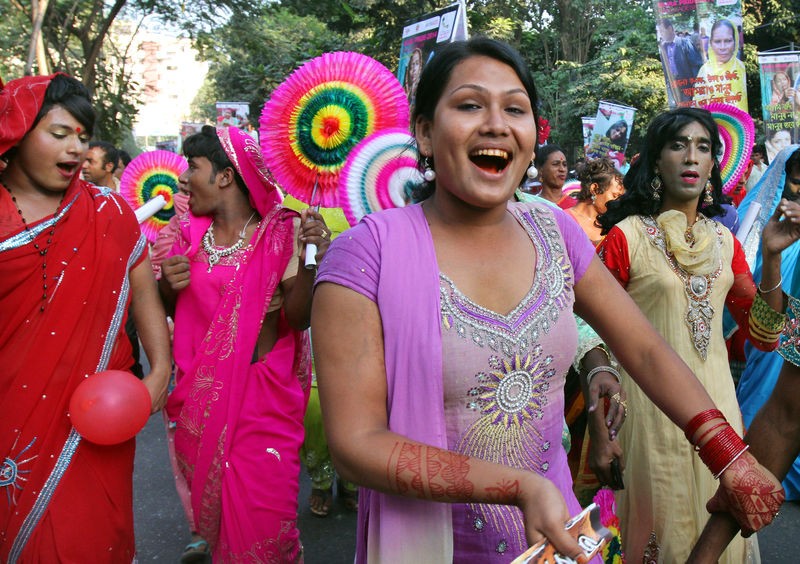 [1]
[1]Hijras are celebrating one year of acceptance as a third gender in Bangladesh. Images by SK Hasan Ali. Copyright Demotix (10/11/2014)
The Bangladesh government is planning to recruit [2] hijras, who have officially been recognized as a separate gender [3] in Bangladesh since 2013, as traffic police in an attempt to rehabilitate and offer them new employment.
Hijra is a feminine gender identity that some people who are born male or intersex adopt, often labeled as transgender by the West. The government's initiative to hire them as traffic police has received high praise from Bangladeshi netizens.
Blogger Arif Jebtik [4] saw this step as sign of the country moving in a positive direction:
হিজড়াদের এই নিয়োগ চিন্তা রাষ্ট্র হিসেবে মানবিক হয়ে উঠার পথে একটি ক্ষুদ্র কিন্তু অতিশয় গুরুত্বপূর্ণ পদক্ষেপ। প্রথম দিকে এই প্রজেক্টটি হয়তো পুরো সফল হবে না, হিজড়াদেরকে সামাজিক ভাবে অবস্থান দেয়ার ক্ষেত্রে অনেক বাঁধা-বিপত্তি আসবে, কলিগদের মাঝে অসন্তোষ হবে, পথের মানুষ হয়তো সহজে তাঁদেরকে সিরিয়াসলি নিতে যাবেন না-তবে আমি আশাবাদী এসব ঝুটঝামেলা শেষ হয়ে এটি একটি সুন্দর উদ্যোগ হয়ে উঠবে।
Recruiting Hijras in police department is a small but an important step for the country to become more humanitarian. At the first phase the project may not be successful, hijras will face lots of obstacle to gain their social status, there will be disappointments among colleagues. People may not be take them seriously. But I hope they will overcome all barriers and it will turn out to be a great initiative.
Twitter user Harun ur Rashid welcomed the government plan:
#Hijras [5] to be recruited as traffic police in #Bangladesh [6]. A very welcome step by #government [7]. http://t.co/R5xHDiju2y [8] pic.twitter.com/w1zxl5I1mH [9]
— Harun ur Rashid (@Chhokanu) May 20, 2015 [10]
Hijras face widespread discrimination in Bangladesh and have trouble finding work. Ex-banker Syed Ashraf Ali [11] wrote in an op-ed in the Financial Express:
Denied of employment opportunities, the hijras are forced to eke out a living by doing things that are often not to our liking. Many take to extortion of money by disrupting work or creating nuisance in public places. Some, however, perform at ceremonies while others turn to begging or sex work.
Rubait Saimum cautioned netizens [12] from praising the government's initiative before hearing the practical details:
[…] যারা দুই দিন আগেও রাস্তায় চাদাবাজি করত তারা কিভাবে ট্রাফিক কন্ট্রোল করবে তা ভাবার বিষয়, সাধারন ট্রাফিক পুলিশের ট্রেনিং বাইরে আর কি কি ট্রেনিং এর আওতায় আনা হচ্ছে তা খতিয়ে দেখা দরকার আর এটা কতটুকু বাস্তবায়ন যোগ্য আর বাস্তবিক তাও ভাবা উচিত শুধু প্রশংসা আর মারহাবা শোনার জন্য কোন সিদ্ধান্ত সরকারের নেয়া উচিত হবে না।
[…] Only days ago hijras were snatching money through threats and different activities on the streets. So, we need to think how they can control traffic in road or get respect. We also need to understand which types of training they will get along with the general police training. Moreover, we also need to think whether this initiative is realistic enough to be implemented successfully and how would it be more realistic. The government can not take any thoughtless decision only to get praise.
Dev Saha thought that hijras will do better than the average traffic police. For example, he mentioned how two hijras captured [13] two of the men who had attacked and killed blogger Washikur Rahman in the street in March as they fled from the murder. Saha wrote [14] in the Dhaka Tribune:
Transgender people might do better job than regular Bangladeshi police as evidenced by the Washikur murder incident. Only they could catch the attackers with their bare hands. Shameful indeed for the well fed Bangladeshi Police!
The department of social services estimates that there are over 10,000 hijras in Bangladesh [15]. Since the 2012-2013 fiscal years, the government has allocated about 9 crore taka (US$1.15 million) to the hijra skills development program.
Dhaka, the capital city of Bangladesh, is one of the most unlivable cities in the world [16], according to the Economist Intelligence Unit, and its extreme traffic congestion contributes a lot to this fame. The city simply can’t handle the increasing volumes of traffic [17], and it is a source of stress for many [18]. There's hope that as traffic police, hijras will be able to contribute to reducing the traffic congestion.